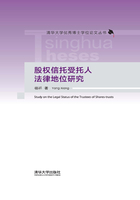
Abstract
Shares-trusts, namely the trusts of shares (including stocks and equities), is a main way to transfer family wealth to next generations, and also the key solution to the current difficulty situation of China's trust industry. The shares held in trusts are registered in the name of trustee(s), while the benefits of shares belong to another party-the beneficiaries. This separation is a typical feature of the Shares-trusts, which makes it hard to recognize its true shareholder(s).Since the trustee is the owner of the trust shares in external relationships, and recorded in the register of shareholders, which meets the corporate formalities and procedures of corporation law, we should identify the trustee of the trust shares as the shareholder in general (hereinafter referred to as "trustee shareholder" or "sharestrustee"). However, in exceptionalcircumstances, suchas shareholder derivative litigation, appraisal rights, and voting trusts, etc., beneficiaries of the trust shares shall also be recognized as shareholders in certain areas, who have the power to file suits and exercise stock rights.
The shares trustee enjoys a wide range of powers, includes the powers in trusts law and the rights of shareholders in corporation law. Ofcourse, the parties could freely set the range and content of shares trustee's powers within the law's permission. However, theshares trustee could exercise the powers which are not written in the terms of trusts, as long as they are necessary to realize the beneficiaries' interests and the purpose of trusts. This book tries to draw the outline of the powers of the shares trustee, especially his unique powers, like voting rights and resignation.
To make sure that the beneficiaries' rights be well protected, the law imposes many kind of duties on the shouders of shares trustee, the core of which are fiduciary duties. Generally speaking, most of the fiduciary duties are default rules, which could be excluded by the parties in trust relationships. This book focuses on the shares trustee's duty of loyalty, duty to exercise reasonable care and skill, duty of impartiality, and duty to disclosure, etc., especially the different substance comparing with an ordinary trustee. When dealing with company affairs, the shares trustee need not only strictly follow the terms of trusts and exercise the shareholders' rights for the interests of beneficiaries, but also follow the corporate formalities and consider the basic interests of the company, its creditor and stakeholders. Since these parties' interests are always in conflicts, the shares trustee need to know how to apply the laws and balance them. This book suggest that we should stick to this principle that mandatory norms of corporate law shall be priority to mandatory norms of trusts law, and mandatory norms shall be priority to the agreements of the parties and default rules. The shares trustee assumes greater responsibilities if he controls the target company, which means that he must work harder to deal with different duties and obligations in conflicts.
In order to avoidthe potential risks indicated above, this book advises that the shares trustee or trustee shareholer shall follow the terms and purpose of trusts, acknowledge the applying rule of laws, put exculpatory provisions in trust contract in advance, and so on.
Key words:Shares-trusts Trustee Trustee shareholder Legal status Conflicts of interests